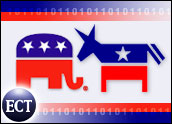
The fate of the controversial Induce Act that would restrict file-sharing technology that can be used to illegally download and share copyrighted material was in question today after negotiations between the music and electronics industries broke down as the current Congressional session nears an end, possibly by this weekend.
The bill, formally known as the Inducing Infringement of Copyrights Act, had been scheduled to be acted on today in the Senate Judiciary Committee, but that action has been delayed in the wake of the collapsed negotiations.
It was not known when, or if, the bill will be acted on before the Congressional session ends.
Representatives of the Recording Industry Association of America (RIAA) and a coalition that includes the Consumer Electronics Association, the IEEE and NetCoalition said talks broke down early yesterday, with the other groups blaming the RIAA for not being willing to move toward a compromise.
Sen. Orrin Hatch, a Utah Republican who chairs the Judiciary Committee, had planned to have the committee vote on the bill today. However, after the last-minute and late-night talks broke down, that vote was apparently put on hold.
A spokesman for the Judiciary Committee said no vote had been taken as of 3 p.m. Washington, D.C., time today and said he did not know if one was scheduled. An agenda for a meeting of the full committee did not list the bill among a dozen action items.
Catching Flack
The rest of the industry groups blamed the RIAA for the breakdown in talks, saying that a compromise version of the bill’s language it put forward at 1 a.m. yesterday represented a step backwards from earlier drafts.
The first attempt at the bill was drafted by the Copyright Office after court rulings declared peer-to-peer (P2P) file-swapping networks such as Morpheus and Grokser were legal.
Will Rodger, director of public policy at the Computer and Communications Industry Association and the Open Source and Industry Association, said committee chairmen often schedule votes on bills as a way to jump-start compromises. However, he said, a compromise is not likely to happen in this situation because the two sides are moving farther apart.
Rodger said the latest draft essentially gives judges the power to stop any technology that is found to be capable of making illegal copies.
“That describes just about every part of the IT infrastructure and most of what is in your living room as well,” Rodger told TechNewsWorld. “We know infringement is bad. Our members deal with it too. But we also know there’s no magic bullet. And right now, this goes to the core of what we do. We’re heading for a showdown.”
The RIAA did not return calls seeking comment. The association had tried to use the courts to force P2P networks to take responsibility for the file-swapping actions of their users, only to have a U.S. Court of Appeals find that makers of the technology were not responsible for how it was used.
Rodger said if the bill passes as drafted, an industry that makes up 1 percent of the gross domestic product would be dictating rules for the tech sector, which accounts for as much as 10 to 15 percent of GDP. And because the legislation will only apply to U.S. companies, overseas competitors will be able to continue to innovate and will quickly fill the void.
Try and Try Again
If the bill is not voted on in this session of Congress, which is expected to end as soon as this weekend, it could return as a rider to appropriations bills passed later in the year. If not, it’s likely to be back next year, Rodger said. “We’ve put out word that we’re going to be watching very closely,” he added.
The various industry groups have been working together since late July, when Hatch asked them to try to work out a bill they could both support during a public hearing before the committee.
“Notwithstanding everyone’s hard work and good intentions, we find ourselves farther apart now than at the outset of this process,” the IEEE, NetCoalition and CEA wrote in a letter to Hatch.
The letter continued: “The recording industry continues to propose language that would not solve the piracy problems in the manner you identified, but instead would effectively put at risk all consumer electronics, information technology products and Internet products and services that aren’t designed to the industry’s liking.”











































